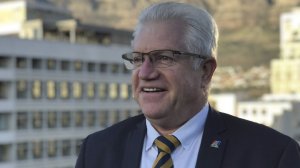Western Cape Premier Alan Winde said following his last meeting with Andre de Ruyter, where the former Eskom CEO painted a bleak picture of South Africa’s energy situation, the province has roped in former Eskom executive Alwie Lester to help tackle the crisis.
In an exclusive interview with Polity, Winde said his province already knew in 2022 that the energy crisis would worsen in South Africa by 2023.
Plans are already underway to migrate places like Khayelitsha and Atlantis, off Eskom’s grid and onto the City’s grid.
The Western Cape plans to allocate R1-billion towards energy over the next three years.
Discussing newly appointed Electricity Minister Kgosientsho Ramokgopa, Winde said his party had been against the move because there were already two Cabinet Ministers in the energy sphere.
Winde suggested the appointment of an energy expert rather than another Minister. However, noting that he had worked with Ramokgopa during the new Minister’s previous role as head of investment and infrastructure in the Office of the President, Winde wished him well in his new position.
He said he had already spoken with Ramokgopa to schedule a meeting to discuss the Western Cape’s energy plans and how it could benefit other provinces.
“I will work with anybody to make sure that we find a better opportunity, system and better energy throughout the province I represent,” Winde stated.
While loadshedding is massively impacting the province’s ability to attract investment, the Premier noted that despite the power cuts his province had created 167 000 jobs of the national 169 000 recorded in the last quarter.
He stated that the Western Cape was also investing in more infrastructure, compared with Gauteng, which accounted for about 35% of South Africa’s gross domestic product.
CRIME AND SAFETY
The Premier remains concerned about crime across the country and reiterated his province’s call for Police Minister Bheki Cele to devolve powers to provinces and municipalities.
He argues that government should have federal police at a national level while the majority of policing should be at a provincial or local level.
The province is concerned that the murder rate is still high with the places that have high crime rates, such as the Nyanga township, having fewer police deployed.
Winde said his province was allocating R2.3-billion a year towards safety and security and 1 300 officers had been deployed to the ten murder hotspots.
He noted that through the province’s interventions there was a steady decline in crime but he believed that improved technology was required to fight criminals who were taking advantage of loadshedding across the country.
“I am disappointed that we haven’t changed the Police Minister. We need to change the debate on this, we have got to make South Africa safer,” he said.
EMAIL THIS ARTICLE SAVE THIS ARTICLE ARTICLE ENQUIRY
To subscribe email subscriptions@creamermedia.co.za or click here
To advertise email advertising@creamermedia.co.za or click here










